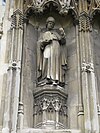Wikipedia:Today's featured list/October 2011
|
Featured list tools: |
October 3
A group of Italian monks and priests was sent by Pope Gregory the Great to Britain in the late 6th and early 7th centuries to convert and Christianize the Anglo-Saxons from their native Anglo-Saxon paganism. Most of the known members of the Gregorian mission became bishops or archbishops, and all but one of the remainder, James the Deacon, became abbots: as his name implies, James never rose beyond the rank of deacon. Among the archbishops were the first five Archbishops of Canterbury: Augustine (statue pictured), Laurence, Mellitus, Justus, and Honorius; all were later canonized as saints. Two other missionaries, Paulinus and Romanus, became bishops. As well as the five archbishops, three other members of the mission are regarded as saints: Peter, James the Deacon, and Paulinus. (Full list...)
October 10
National parks of Sweden are managed by the Swedish Environmental Protection Agency. The goal of the national park service is to create a system of protected areas that represent the distinct natural regions of the country. In 1909, Sweden became the first country in Europe to establish such parks when nine were opened following the Parliament of Sweden's passing of a law on national parks that year. This was followed by the establishment of seven parks between 1918 and 1962 and thirteen between 1982 and 2009. Mountain terrain comprises approximately 90% of the 29 parks' combined area. The reason for this is the extensive mountain areas taken up by the large northern parks—Sarek National Park (pictured) and Padjelanta National Park. Many of the northern parks are part of the Laponian area, one of Sweden's UNESCO World Heritage Sites due to its preserved natural landscape and habitat for the native reindeer-herding Sami people. The southernmost parks—Söderåsen National Park, Dalby Söderskog National Park and Stenshuvud National Park—are covered with broadleaf forest. (Full list...)
October 17
The competitive history of Watford Football Club began in 1886, when English football club Watford Rovers competed in the FA Cup for the first time. The team joined the Southern League in the 1896–97 season, and renamed as Watford F.C. in 1898. Under Harry Kent's management, Watford won the Southern League title in the 1914–15 season, joined the Football League in 1920, and moved to Vicarage Road stadium (pictured) in 1922. After spending most of the following five decades at the third and fourth levels of English football, Watford's fortunes changed dramatically in the 1970s. With financial backing from local-born musician Elton John, and Graham Taylor as manager, the team ascended through the divisions. Watford won the Fourth Division title in the 1977–78 season; they came second in the First Division five seasons later, with Luther Blissett finishing as the division's top scorer. In the following campaign, Watford competed in the UEFA Cup for the first time, and also reached the 1984 FA Cup Final. Since relegation from the First Division in 1988, the team has spent all but four seasons competing at the second level of English football. (Full list...)
October 24
The U.S. state of Oregon has 26 official emblems, as designated by the Oregon State Legislature. Oregon's first state symbol was the motto Alis Volat Propriis, written and translated in 1854. Latin for "She Flies With Her Own Wings", the motto remained unchanged until 1957, when "The Union" became the official state motto. Alis Volat Propriis became the state motto once again in 1987. Originally designed in 1857, usage of the Oregon State Seal began after Oregon became the 33rd state of the United States on February 14, 1859. The motto and seal served as Oregon's only symbols until over 50 years later, when the Oregon-grape became the state flower in 1899. Oregon had 6 official symbols by 1950 and 22 symbols by 2000. The newest symbol of Oregon is Jory soil, declared the state soil in 2011. (Full list...)
October 31
There have been 41 assemblies in the history of the Parliament of Canada, the legislative body of the Government of Canada. The Parliament is composed of the House of Commons (lower house), the Senate (upper house), and the Sovereign, represented by the Governor General. A new parliament begins after an election of the House of Commons and can sit for up to five years. Canada uses a Westminster-style parliamentary government, in which the leader of the party with the most seats in the House of Commons becomes Prime Minister. The leader of the party with the second-most seats in the House becomes the Leader of the Official Opposition, and debate (formally called Oral Questions) between the parties is presided over by the Speaker of the House. The Canadian Parliament is located at Parliament Hill in the capital city, Ottawa. (Full list...)





